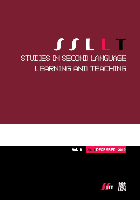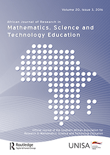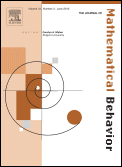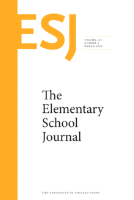
Journal fur Mathematik-Didaktik
Scope & Guideline
Pioneering Research for Effective Mathematics Education
Introduction
Aims and Scopes
- Diagnostic Competence in Mathematics Education:
The journal emphasizes research on diagnostic competencies, exploring how educators assess and address students' mathematical understanding and misconceptions. - Teaching and Learning Practices:
It covers innovative teaching practices, classroom interactions, and the role of social norms in mathematics education, aiming to improve pedagogical strategies. - Mathematical Reasoning and Argumentation:
The journal highlights studies on mathematical argumentation, reasoning processes, and the development of students' ability to justify their solutions. - Cognitive and Affective Factors in Learning:
Research on cognitive processes, affective factors, and their impact on learning mathematics is central, including studies on memory, anxiety, and motivation. - Cultural and Contextual Influences:
The journal addresses the influence of cultural and contextual factors on mathematics education, examining how different environments affect teaching and learning outcomes.
Trending and Emerging
- Longitudinal Studies in Teacher Development:
There is a growing trend towards longitudinal studies that track the development of preservice teachers' diagnostic competencies over time, providing insights into effective teacher education practices. - Integration of Technology in Mathematics Education:
Emerging research focuses on the use of digital tools and platforms for enhancing mathematics learning, including adaptive learning technologies and video-based learning environments. - Collaborative Learning and Discourse:
Studies are increasingly examining the role of collaborative learning and classroom discourse in fostering deeper understanding and engagement in mathematics. - Cultural and Contextual Relevance in Mathematics Instruction:
Research is trending towards understanding how cultural and contextual factors influence mathematics teaching and learning, particularly in diverse classrooms. - Focus on Early Mathematics Education:
There is an emerging emphasis on early mathematics education, with research exploring effective strategies for fostering mathematical thinking and problem-solving skills in young children.
Declining or Waning
- Traditional Assessment Methods:
There has been a noticeable decline in research focused on traditional assessment methods in mathematics education, with a shift towards more formative and diagnostic assessment approaches. - Basic Computational Skills:
Research on basic computational skills has waned, as the emphasis has moved toward conceptual understanding and problem-solving abilities rather than rote memorization of procedures. - Purely Theoretical Frameworks:
The journal has seen less emphasis on purely theoretical frameworks that do not connect to practical teaching applications, favoring studies with direct implications for classroom practice. - Focus on Secondary Education:
While secondary education remains important, there is a decreasing focus on this level as more attention is directed toward early childhood and primary education, reflecting the need for early intervention. - Individual Learning Styles:
Research centered on individual learning styles has diminished, as contemporary studies increasingly emphasize more holistic and inclusive approaches to teaching that consider diverse learning environments.
Similar Journals

Studies in Second Language Learning and Teaching
Connecting researchers and practitioners in linguistics.Studies in Second Language Learning and Teaching is a premier open-access journal dedicated to advancing research and scholarship in the fields of education, linguistics, and language acquisition. Published by ADAM MICKIEWICZ UNIVERSITY, KALISZ, this journal has consistently achieved high acclaim, reflected in its impressive Q1 rankings in both Education and Linguistics and Language categories for 2023. With a robust focus on innovative methods, effective pedagogical strategies, and interdisciplinary approaches, Studies in Second Language Learning and Teaching aims to facilitate dialogue among researchers, educators, and practitioners, fostering a deeper understanding of language learning and teaching in diverse contexts. Since its transition to open access in 2011, the journal has expanded its reach, providing valuable resources and research findings to a global audience. With an exceptional Scopus ranking placing it in the top percentiles across multiple categories, this journal stands as a crucial platform for the dissemination of ground-breaking research in second language education.

African Journal of Research in Mathematics Science and Technology Education
Transforming Education with African Perspectives on STEMAfrican Journal of Research in Mathematics Science and Technology Education is a distinguished academic journal, published by Routledge Journals, Taylor & Francis Ltd, dedicated to advancing knowledge in the fields of mathematics, science, and technology education within the African context. With an ISSN of 1811-7295 and an E-ISSN of 2469-7656, this journal has been a crucial platform for scholarly discourse since its inception in 1997, steadily gaining reputation and impact among researchers, educators, and policymakers. The journal features a rigorous peer-review process, ensuring that high-quality research garners visibility across various disciplines, as evidenced by its Quartile rankings in Computer Science Applications, Education, Engineering, Mathematics, and Physics and Astronomy. With its commitment to serving the educational community and fostering innovative practices, the African Journal of Research in Mathematics Science and Technology Education plays a pivotal role in shaping the future of STEM education in Africa and beyond.

Journal of Mathematical Behavior
Transforming Understanding through Mathematical InsightsThe Journal of Mathematical Behavior, published by ELSEVIER SCIENCE INC, is a premier interdisciplinary journal dedicated to the exploration of mathematical thinking, learning, and education. With a strong history of publication since 1994 and converging towards 2024, this journal offers vital insights and innovative research in the fields of Applied Mathematics, Applied Psychology, and Education, holding notable rankings in various categories, including Q1 in Education and Q2 in both Applied Mathematics and Psychology as of 2023. The journal is positioned favorably in Scopus rankings, highlighting its impact in the realms of Mathematics and Education. It serves as a critical platform for researchers, educators, and practitioners aiming to enhance pedagogical strategies and foster effective mathematical understanding. Although it does not offer open access, the journal remains a cornerstone for advancing knowledge and dialogue within the mathematical education community,** making it an essential resource for anyone invested in the complexities and applications of mathematical behavior.

STUDIA MATHEMATICA
Fostering Innovation in MathematicsSTUDIA MATHEMATICA is a distinguished journal published by the Polish Academy of Sciences Institute of Mathematics - IMPAN, dedicated to advancing the field of mathematics since its inception. With an ISSN of 0039-3223 and an E-ISSN of 1730-6337, this journal serves as a significant forum for mathematicians worldwide to disseminate innovative research and theoretical advancements. Operating under a stringent peer-review process, STUDIA MATHEMATICA boasts a commendable impact factor that places it in the Q2 category within the mathematics discipline, indicating its critical role in the academic community. Covering a broad spectrum of mathematical topics, the journal aims to encourage interdisciplinary collaboration and foster a deeper understanding of both applied and theoretical aspects of mathematics. Researchers, professionals, and students alike will find a wealth of knowledge in its pages, contributing to the development of the mathematics field from its base in Warsaw, Poland. As it converges various strands of mathematical thought from 1996 to 2024, STUDIA MATHEMATICA continues to uphold its reputation as an essential resource for contemporary mathematical scholarship.

ELEMENTARY SCHOOL JOURNAL
Elevating Elementary Education Through ResearchElementary School Journal, published by University of Chicago Press, is a leading academic journal focused on the field of education. With an ISSN of 0013-5984 and an E-ISSN of 1554-8279, this esteemed publication ranks in the top quartile (Q1) of educational journals, reflecting its influential role in shaping educational research and practice. Covering diverse topics integral to elementary education, the journal provides a platform for innovative research and discussions that aim to enhance teaching and learning experiences in the early years of schooling. With a Scopus ranking of #628 out of 1543 in the Social Sciences and Education category, the journal is positioned as a pivotal resource for researchers, educators, and policy-makers committed to advancing knowledge in this critical area. Although not an open-access publication, the journal offers valuable insights backed by rigorous scholarship, making it a vital part of academic collections across the globe. We invite scholars and practitioners alike to contribute to and benefit from the rich body of work published in this journal, which has been operational from 1996 and will continue its impactful journey through 2024.

International Journal for Technology in Mathematics Education
Advancing interdisciplinary approaches in mathematics education.International Journal for Technology in Mathematics Education (ISSN: 1744-2710, E-ISSN: 2045-2519) is a pioneering platform published by Research Information Ltd that focuses on the interplay between technology and mathematics education. Established to bridge the gap between pedagogical practices and technological advancements, this journal connects researchers, educators, and practitioners in a bid to enhance teaching methodologies and optimize learning outcomes in mathematics. Although its coverage in Scopus was discontinued after 2020, it continues to be a vital resource for those interested in the integration of technology into educational settings. With its significant emphasis on interdisciplinary approaches, the journal has garnered attention in the realms of social sciences and computer science, with Scopus rankings reflecting its niche contributions. This journal is crucial for professionals aiming to explore innovative techniques in mathematics education, making it an invaluable addition to any academic library.

Teaching of Mathematics
Elevating Mathematics Education Through Research and InnovationTeaching of Mathematics is an esteemed open-access journal devoted to the field of mathematics education, published by DRUSTVO MATEMATICARA SRBIJE in Serbia. Since its inception in 1998, the journal aims to foster scholarly dialogue and disseminate research findings that contribute to the effective teaching and learning of mathematics. Although it currently holds a Q4 ranking in both Education and Miscellaneous Mathematics categories, the journal is dedicated to providing a platform for innovative pedagogical strategies, theoretical discussions, and empirical studies. With an ISSN of 1451-4966 and an E-ISSN of 2406-1077, Teaching of Mathematics offers open access to its content, ensuring that researchers, educators, and students can freely benefit from its contributions. As it converges towards 2024, the journal aspires to enhance its impact and influence within the mathematical education community, encouraging all stakeholders to share their insights and advancements in this critical area of study.

Journal of Mathematics Teacher Education
Shaping the Future of Mathematics Education WorldwideJournal of Mathematics Teacher Education, published by SPRINGER, serves as a pivotal platform for scholarly communication in the fields of Education and Mathematics. With a distinguished Q1 ranking in both disciplines and exceptional Scopus rankings—placing it in the top 94th percentile for Mathematics and the 84th percentile for Education—the journal is dedicated to advancing research and practice in mathematics education from a global perspective. Established in 2005 and converging towards 2024, it invites contributions that investigate innovative teaching strategies, curriculum development, and teacher education methodologies. Although the journal does not offer Open Access, its rich collection of empirical studies, reviews, and theoretical articles provides invaluable resources for educators, researchers, and students aiming to elevate the quality of mathematics instruction. Situated in Dordrecht, Netherlands, the Journal of Mathematics Teacher Education remains a significant asset to the academic community, fostering discussions that drive progress and enhance student learning experiences.

International Electronic Journal of Mathematics Education
Transforming Educational Practices with Rigorous ResearchInternational Electronic Journal of Mathematics Education (IEJME) is a premier platform dedicated to advancing the field of mathematics education through rigorous research and innovation. Published by MODESTUM LTD, this interdisciplinary journal focuses on the pedagogical, theoretical, and empirical aspects of mathematics education, facilitating a deep understanding of teaching practices, learning methods, and curriculum development. With its commitment to open access, IEJME ensures that research findings are accessible to a global audience, fostering collaborative efforts among educators, researchers, and practitioners. The journal has maintained a commendable position in academic rankings, holding a Rank of #114/399 in General Mathematics and #782/1543 in Education within Scopus, highlighting its significant contribution to the scholarly community. By publishing high-quality research from 2009 to 2016 and 2021 to 2024, IEJME continues to serve as an essential resource for those invested in enhancing mathematical understanding in educational contexts, inspiring future generations of mathematicians and educators.

English Teaching and Learning
Empowering Educators with Research-Driven PracticesEnglish Teaching and Learning is a distinguished academic journal published by SPRINGER SINGAPORE PTE LTD, focusing on the dynamic fields of education and linguistics. With an ISSN of 1023-7267 and an E-ISSN of 2522-8560, this journal serves as a vital platform for researchers, educators, and practitioners interested in advancing the understanding of English language instruction and learning methodologies. Recognized for its high standards, it has achieved a notable Q2 ranking in Education and a prestigious Q1 ranking in Linguistics and Language in 2023, underscoring its impact within these essential scholarly fields. The journal, which spans a converged publication period from 2015 to 2024, endeavors to disseminate innovative research, theoretical insights, and practical applications, making it an invaluable resource for anyone committed to enhancing English education globally. Although it does not operate under an open-access model, its contributions are pivotal in shaping contemporary discourse in English teaching and learning.